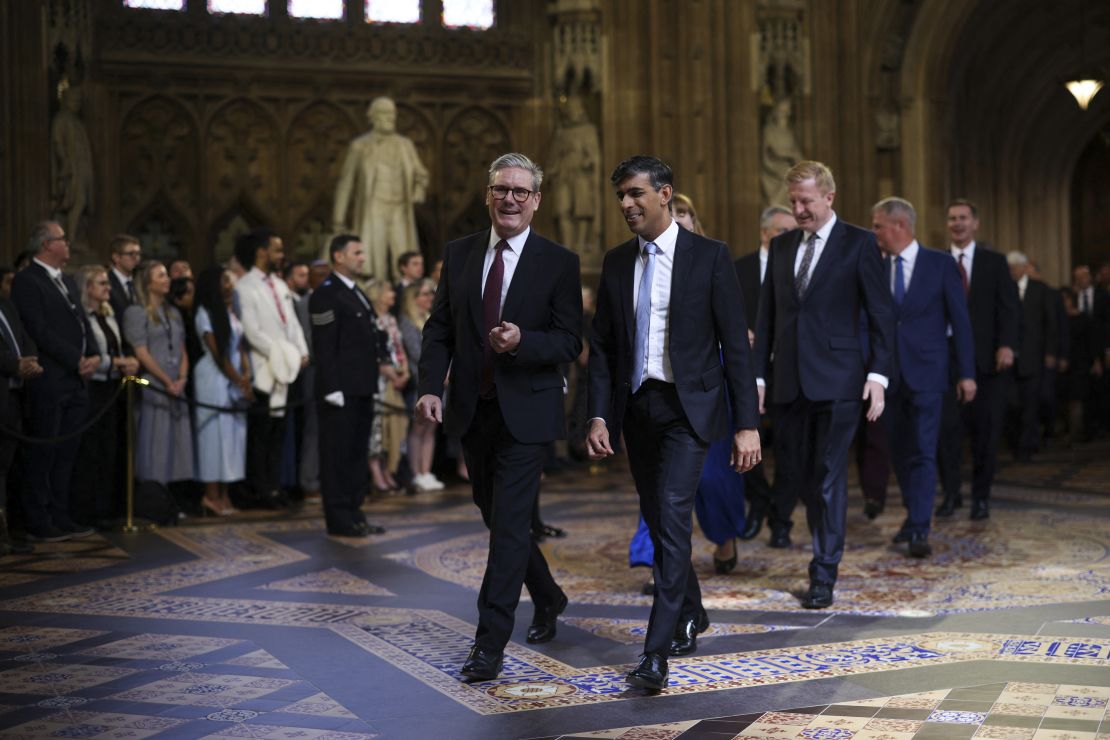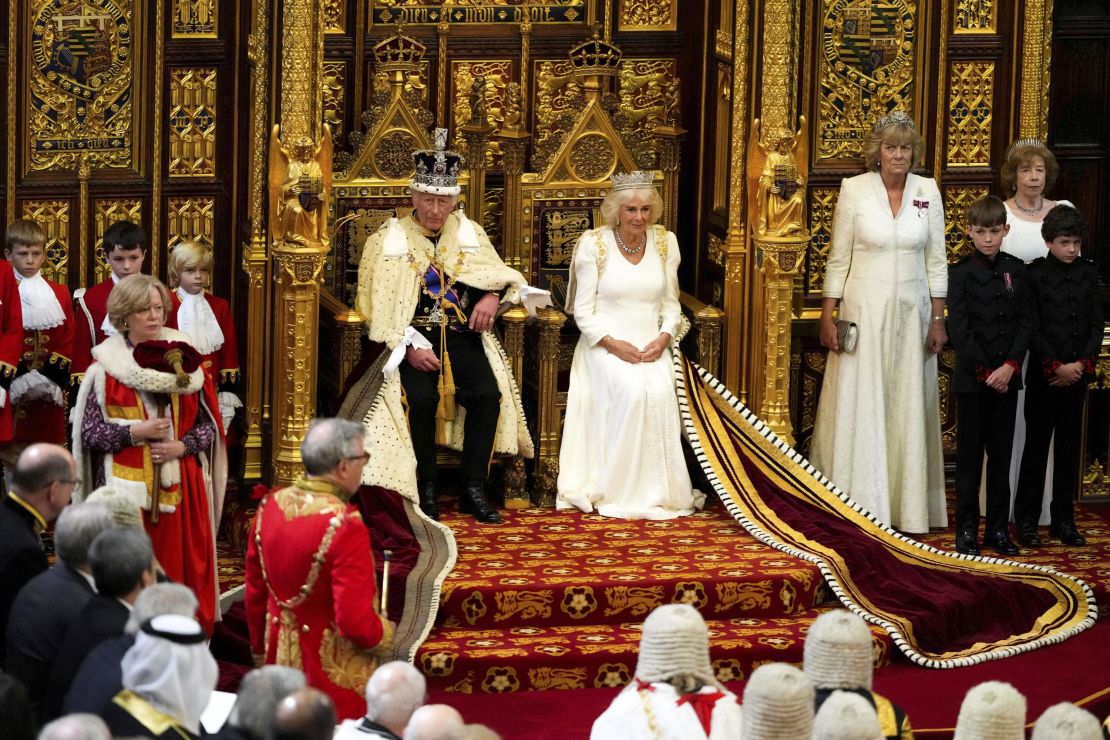Keir Starmer, Britain’s new prime minister, pitched himself as an antidote to “the snake oil charm of populism” on Wednesday, unveiling sweeping plans to target housebuilding, crime, illegal migration and a breakdown in public trust during the first ceremonial King’s Speech of his government.
King Charles III formally opened a new session of parliament by reading out Starmer’s agenda at a grandiose event that brings together Britain’s royal pageantry and political class, two weeks after his landslide landslide election win brought a 14-year era of Conservative rule to an emphatic end.
The speech focused on Starmer’s central slogan of “national renewal,” and included pledges to nationalize Britain’s railways, tackle a housing crisis by changing planning laws to build more affordable homes, and intensifying efforts to tackle illegal migration.
Starmer more broadly took swipes at the Tory governments that had ruled Britain since 2010, and at the swell of populism that has rippled across the UK and Europe, attempting to lay claim to Britain’s center ground with a public push for pragmatism.
“No more wedge issues. No more gimmicks,” Starmer told lawmakers in the House of Commons as debate on his agenda began, insisting his government would “solve problems, not exploit them.”
“The fight for trust is the battle that defines our political era,” Starmer said.
His 40-bill agenda includes measures crafted to appeal to both older and younger generations, as Starmer seeks to maintain the broad coalition of voters that put him into Downing Street earlier this month. But his introduction to that agenda also contained an effort to counteract the rise of populism in the UK and Europe. “The snake oil charm of populism may sound seductive, but it drives us into the dead end of further division and greater disappointment,” Starmer said.
While the speech fleshed out some of the growth-orientated vision Starmer pitched during the summer’s election campaign, it was light on details on other areas, including how Starmer would meaningfully bolster Britain’s border security after an election campaign disrupted by public concern over small boat crossings to the UK.
And Starmer opted to swerve some of the thornier constitutional and voting changes he had pledged to make during the campaign, including an upper age limit on peers allowed to sit in the House of Lords, and the lowering of the voting age to 16.

Pomp and politics collide
The state opening of parliament is a rare collision of pomp and politics, featuring a series of centuries-old flourishes and conventions that catch even many of Britain’s lawmakers off guard.
The production began when King Charles III and his wife, Camilla, made their way by carriage from Buckingham Palace to the Houses of Parliament, before MPs were summoned by Black Rod – a role established in the 1300s – to watch his speech in the House of Lords chamber.
Starmer and his defeated rival, Conservative leader Rishi Sunak, shared a warm conversation before and after the speech, their roles dramatically reversed after the election on July 4 that saw Labour win a landslide in parliament, although with a modest share of the votes.
Once the speech began, focus shifted to the first Labour legislative plan in a decade and a half. It put at its heart an effort to build, after a decade of stalled growth that had seen housing and infrastructure projects scuppered across Britain.
Starmer also formalized plans to renationalize Britain’s rail network in the coming years, and to create a publicly-owned renewable energy company.
Other parts of the speech continued Labour’s efforts to appeal to traditionally conservative voters who have lost faith in the Tory party after a tumultuous stretch in government.
In particular, Starmer promised a clampdown on illegal migration and small boat crossings across the Channel – an issue that plagued successive Conservative governments and gave rise to a surge in support for Reform UK, a populist anti-migrant bloc that won more than 4 million votes in the election.

The speech pledged extra powers for law enforcement to investigate people smuggling, including stopping and searching at the border, and the creation of a new Border Security Command. It also promised to clear Britain’s vast asylum backlog, which has ballooned to near 100,000 people in recent years and forced the government to accommodate asylum seekers in hotels and detention centers for months while they await news on their claim.
At home, a number of institutions were targeted for modernization – most awkwardly, the very room in which Charles gave his speech. Under government plans, hereditary peers will no longer be able to sit and vote in the House of Lords, in a “first step in wider reform” to the chamber.
A new draft Race Equality Bill will meanwhile make it mandatory for large employers to report ethnicity and disability pay in the same way they currently report gender pay.
And legislation for a long-awaited ban on both gay and transgender conversion therapy – efforts to change someone’s sexual orientation or gender identity – was announced, having been first trailed by Theresa May in 2018 but never brought to light.
Sunak tells Starmer he “must now deliver change”
Starmer acknowledged a breakdown in belief among the British public that politics can be a force for good – trust in politics is at record lows, studies have suggested, after a lengthy period dominated by scandal in Westminster.
But his agenda will be underpinned by a large dealing of skepticism that Britain’s public services can be revived without a much larger infusion of cash than the government is offering.
Little in the speech focused on Britain’s National Health Service (NHS), or on its social care sector, where the priority will be management rather than new legislation.
After the King read Starmer’s speech, MPs gathered in the Commons to debate Labour’s agenda, with former Prime Minister Rishi Sunak promising to lead the opposition constructively while a drawn-out contest to replace him as Conservative leader takes place.
“The party opposite has successfully tapped into the public’s desire for change, but they must now deliver change,” Sunak said.
He and Starmer had shared warm exchanges earlier in the day – which Starmer said had partially focused on England’s football team – but the rigor of Britain’s politics returned and tension crept back into the chamber as Sunak criticized the scrapping of his plan to deport some asylum seekers to Rwanda, and claimed that Labour had inherited, thanks to his work, an economy on an upward trajectory.
And Sunak urged Starmer to match his committment to increase the UK’s defense spending to 2.5% of its GDP, saying it “will show the Americans that we do not expect them to bear every burden” within NATO.
Those arguments will intensify in the coming weeks, as Labour introduces its first bills to Parliament – beginning with three priority measures from the speech later this week.


